英语国家概况论文-政治体制 英文
美国政治系统英语作文
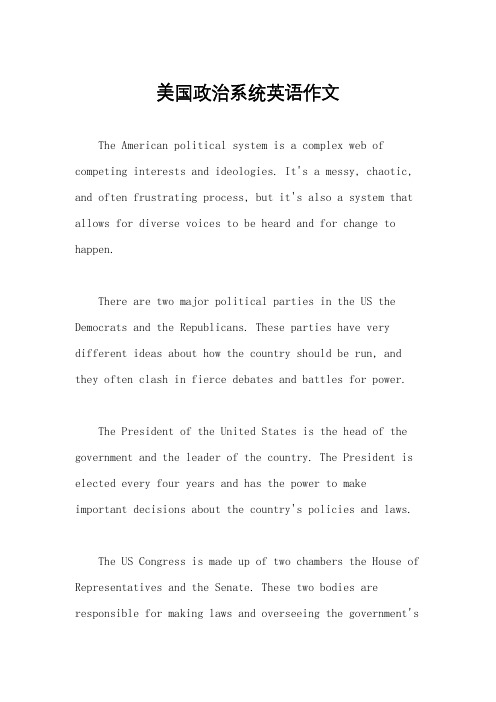
美国政治系统英语作文The American political system is a complex web of competing interests and ideologies. It's a messy, chaotic, and often frustrating process, but it's also a system that allows for diverse voices to be heard and for change to happen.There are two major political parties in the US the Democrats and the Republicans. These parties have very different ideas about how the country should be run, and they often clash in fierce debates and battles for power.The President of the United States is the head of the government and the leader of the country. The President is elected every four years and has the power to make important decisions about the country's policies and laws.The US Congress is made up of two chambers the House of Representatives and the Senate. These two bodies are responsible for making laws and overseeing the government'sactions.The Supreme Court is the highest court in the US and is responsible for interpreting the Constitution and making decisions about important legal issues.In addition to the President, Congress, and the Supreme Court, there are also many other government agencies and departments that play a role in shaping the country's policies and laws. These agencies are often staffed by experts and professionals who work to implement and enforce the government's decisions.The American political system is often criticized for being slow, inefficient, and prone to gridlock. However,it's also a system that allows for change and progress to happen, albeit at a sometimes glacial pace. Ultimately, the American political system reflects the messy and complicated nature of democracy itself.。
美国政治制度的英语作文
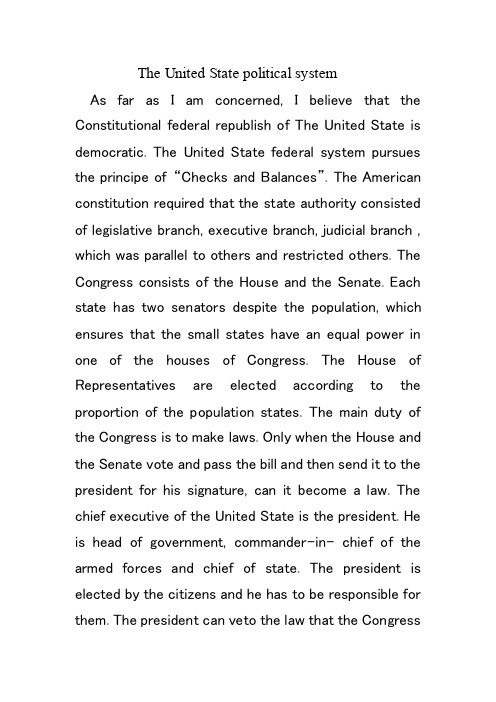
The United State political systemAs far as I am concerned, I believe that the Constitutional federal republish of The United State is democratic. The United State federal system pursues the principe of “Checks and Balances”. The American constitution required that the state authority consisted of legislative branch, executive branch, judicial branch , which was parallel to others and restricted others. The Congress consists of the House and the Senate. Each state has two senators despite the population, which ensures that the small states have an equal power in one of the houses of Congress. The House of Representatives are elected according to the proportion of the population states. The main duty of the Congress is to make laws. Only when the House and the Senate vote and pass the bill and then send it to the president for his signature, can it become a law. The chief executive of the United State is the president. He is head of government, commander–in–chief of the armed forces and chief of state. The president is elected by the citizens and he has to be responsible for them. The president can veto the law that the Congressproposes. However,Congress can enact the law despite the president’s views only if two thirds of the members of both houses vote in favour of it. The judicial branch is headed by the Supreme Court. The judges are appointed by the president. The judges can have lifelong tenure if they do not commit a crime.In my opinion, I think that both the presidential election and the enactment of law in the United State are democratic. Thomas Jefferson ever said“As far as I understand it, the supreme power of the most reliable person in charge can only be the people themselves”in 1820. The American system of government represents the citizens benefit and promotes the economic development rapidly.However, the American system has also existed disadvantages. I think the racial prejudice is a serious problem in American society. A 18‐year‐old black youth named Michael Brown was shot by a white policeman and finally died in Missouri, America on August 9th 2014. which caused large‐scale demonstrations and developed the violent incident such as beating,smashing and looting in many places. When the grand jury judgedthat the white policeman can not be accused on November 24th , the protests spread quickly more than 170 cities in America. This issue caused wild public concern not only at home but also all over the world. Unfortunately, the racial problem has not been solved yet.Different from the America, China carried out the system of people’s congress, which fits our country’s situation. In political parties, America has two‐party system but China insists an single‐party system. I think that Chinese system has high efficiency in a short time but has poor long‐term stability, because of lacking power supervision. Instead, American system has low efficiency in short‐term but has high efficiency for a long time. Therefore, we can not say the Chinese system is superior to American system, because they both fit their own country’s situation and have positive impact on the economical development. However,the officials looting has become a more and more serious problem in our country. The officials’duties are serving to the people and doing something beneficial to the public. But they failed in their responsibility and looted,which may cause the public feel disappointed to the government. Although the government has taken effective measures to suppress the corruption,officials looting remains a serious problem in our country. So,I think that our government should perfect the power supervision system constantly and prevent the officials from looting. Only by doing this, our country may become better and better.。
美国政治制度英文
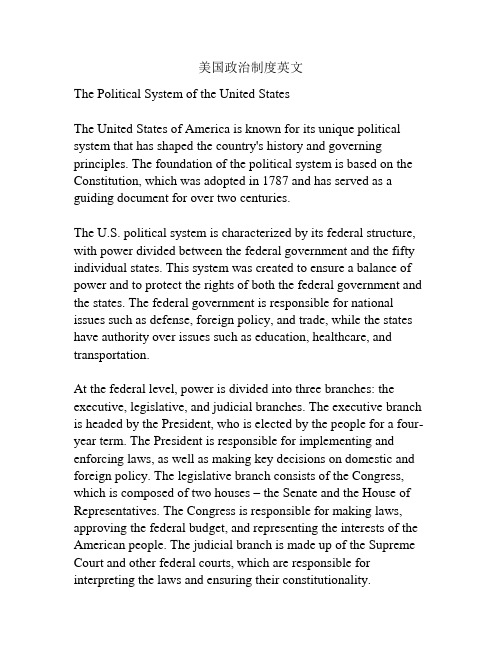
美国政治制度英文The Political System of the United StatesThe United States of America is known for its unique political system that has shaped the country's history and governing principles. The foundation of the political system is based on the Constitution, which was adopted in 1787 and has served as a guiding document for over two centuries.The U.S. political system is characterized by its federal structure, with power divided between the federal government and the fifty individual states. This system was created to ensure a balance of power and to protect the rights of both the federal government and the states. The federal government is responsible for national issues such as defense, foreign policy, and trade, while the states have authority over issues such as education, healthcare, and transportation.At the federal level, power is divided into three branches: the executive, legislative, and judicial branches. The executive branch is headed by the President, who is elected by the people for a four-year term. The President is responsible for implementing and enforcing laws, as well as making key decisions on domestic and foreign policy. The legislative branch consists of the Congress, which is composed of two houses – the Senate and the House of Representatives. The Congress is responsible for making laws, approving the federal budget, and representing the interests of the American people. The judicial branch is made up of the Supreme Court and other federal courts, which are responsible for interpreting the laws and ensuring their constitutionality.The U.S. political system is also known for its two-party system, consisting of the Democratic Party and the Republican Party. While there are other political parties in the country, these two parties dominate the political landscape. Elections are held regularly to choose political leaders at all levels – from the President to local officials. The process of electing the President is unique, as it involves an electoral college system rather than a direct popular vote. This system ensures that small states have a say in the election process, as each state is allocated a number of electoral votes based on its representation in Congress.In addition to the division of powers, the U.S. political system guarantees certain rights and freedoms to its citizens. These rights are outlined in the Bill of Rights, the first ten amendments to the Constitution, and include freedom of speech, religion, and assembly. It also guarantees due process of law and protection against unreasonable searches and seizures.The United States' political system has faced many challenges throughout its history, but it has proven resilient and adaptable. Its federal structure and separation of powers have promoted checks and balances, preventing any one branch of government from becoming too powerful. The two-party system ensures a diversity of viewpoints and promotes competition within the political system. In conclusion, the political system of the United States is characterized by its federal structure, separation of powers, and two-party system. It is built on the principles of the Constitution, which guarantees rights and freedoms to its citizens. Despite itschallenges, the U.S. political system has been instrumental in shaping the country's history and promoting democratic governance.。
英国美国政治制度英语作文
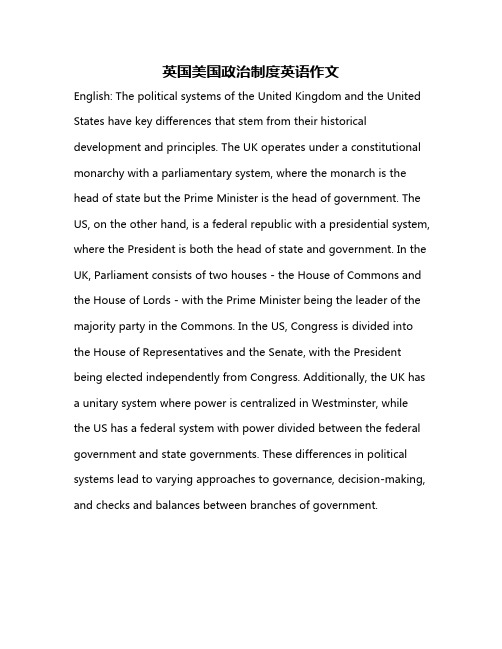
英国美国政治制度英语作文English: The political systems of the United Kingdom and the United States have key differences that stem from their historical development and principles. The UK operates under a constitutional monarchy with a parliamentary system, where the monarch is the head of state but the Prime Minister is the head of government. The US, on the other hand, is a federal republic with a presidential system, where the President is both the head of state and government. In the UK, Parliament consists of two houses - the House of Commons and the House of Lords - with the Prime Minister being the leader of the majority party in the Commons. In the US, Congress is divided into the House of Representatives and the Senate, with the President being elected independently from Congress. Additionally, the UK has a unitary system where power is centralized in Westminster, while the US has a federal system with power divided between the federal government and state governments. These differences in political systems lead to varying approaches to governance, decision-making, and checks and balances between branches of government.中文翻译: 英国和美国的政治制度有着根源于历史发展和原则的重要差异。
英国的政治英文作文
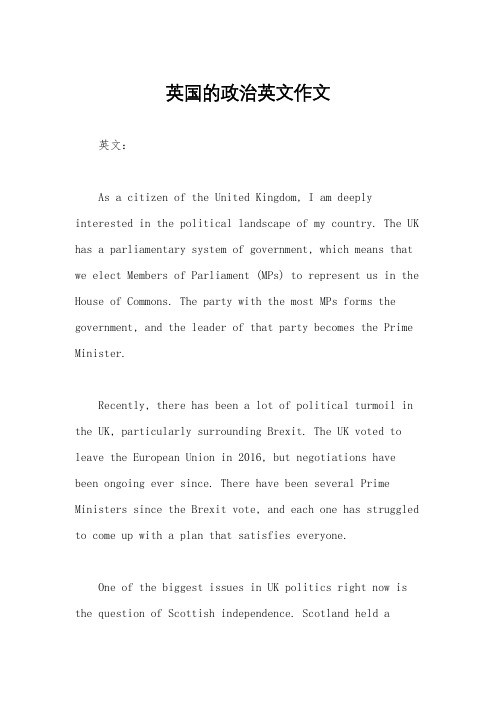
英国的政治英文作文英文:As a citizen of the United Kingdom, I am deeply interested in the political landscape of my country. The UK has a parliamentary system of government, which means that we elect Members of Parliament (MPs) to represent us in the House of Commons. The party with the most MPs forms the government, and the leader of that party becomes the Prime Minister.Recently, there has been a lot of political turmoil in the UK, particularly surrounding Brexit. The UK voted to leave the European Union in 2016, but negotiations have been ongoing ever since. There have been several Prime Ministers since the Brexit vote, and each one has struggled to come up with a plan that satisfies everyone.One of the biggest issues in UK politics right now is the question of Scottish independence. Scotland held areferendum on independence in 2014, which was narrowly defeated. However, since then, the Scottish National Party (SNP) has gained a lot of support, and there is growing pressure for another referendum. This is a complex issue, as it raises questions about national identity, economic stability, and the future of the UK as a whole.Another issue that has been in the news recently is the scandal surrounding Dominic Cummings, an advisor to the Prime Minister. Cummings was accused of breaking lockdown rules during the COVID-19 pandemic, and there were callsfor him to resign. However, he refused to do so, and the Prime Minister stood by him. This has led to accusations of cronyism and a lack of accountability in government.Overall, the political situation in the UK is complex and ever-changing. There are many different opinions and viewpoints, and it can be difficult to keep up with all the latest developments.中文:作为英国公民,我对我国的政治局势非常感兴趣。
美国政治英语作文
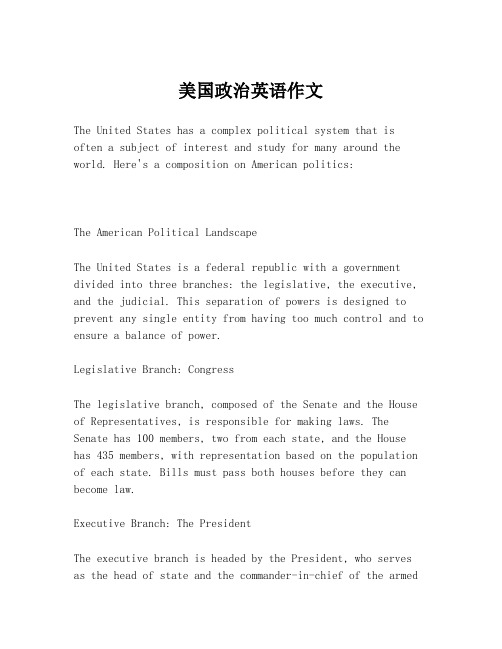
美国政治英语作文The United States has a complex political system that is often a subject of interest and study for many around the world. Here's a composition on American politics:The American Political LandscapeThe United States is a federal republic with a government divided into three branches: the legislative, the executive, and the judicial. This separation of powers is designed to prevent any single entity from having too much control and to ensure a balance of power.Legislative Branch: CongressThe legislative branch, composed of the Senate and the House of Representatives, is responsible for making laws. The Senate has 100 members, two from each state, and the House has 435 members, with representation based on the population of each state. Bills must pass both houses before they can become law.Executive Branch: The PresidentThe executive branch is headed by the President, who serves as the head of state and the commander-in-chief of the armedforces. The President is elected every four years and is responsible for enforcing laws passed by Congress. The President also has the power to veto legislation, although this can be overridden by a two-thirds majority in both houses of Congress.Judicial Branch: The Supreme CourtThe judicial branch interprets the Constitution and federal laws. The Supreme Court, composed of nine justices, is the highest court in the land. Its decisions are final and can set precedents for future cases.Political PartiesThe two major political parties in the United States are the Democrats and the Republicans. The Democrats generally lean towards progressive policies, advocating for social justice and environmental protection, while the Republicans tend to favor conservative policies, emphasizing limited government and free-market principles.ElectionsElections in the United States are a cornerstone of its democracy. The presidential election, held every four years, is one of the most watched events globally. Additionally, there are midterm elections, which occur every two years, where all House seats and one-third of Senate seats are up for election.Challenges and DebatesAmerican politics is not without its challenges. Issues such as healthcare, immigration, and gun control are hotly debated topics. The political climate can be polarized, withdiffering views often leading to intense discussions and disagreements.ConclusionUnderstanding American politics requires an appreciation of its historical context, the structure of its government, and the role of its citizens in the democratic process. The United States' political system, while not perfect, is a model for many countries seeking to establish a democratic government.This composition provides a brief overview of the American political system, touching on the three branches of government, the two major political parties, and some of the key issues and challenges faced by the nation.。
用英文介绍中国政体

用英文介绍中国政体The System of People's CongressI. The nature and position of the system of people's congre ssThe system of people's congress is an organizational form for the state power in China. It is China's fundamental political system.The power in the People's Republic of China belongs to the people and the organ for the people to exercise state power is the National People's Congress and local people's congresses at all levels.The National People's Congress (NPC) and local people's congresses are established through democratic elections, responsible to and supervised by the people.State administrative, judicial and procuratorial organs are created by, responsible to and supervised by the people's congresses.The National People's Congress is the highest org an of state power. Local people's congresses are local organs of state power.II. The National People's Congre ss1. The composition and term of office of the NPCThe NPC is composed of deputies elected from the provinces, autonomous regions and municipalit ies directly under the Central Government and deputies elected by the armed forces.Deputies to the NPC are organized into delegations according to the units they are elected from. Each delegation is headed y a chairman and vice chairmen.All the ethnic minorities are entitled to appropriate representation.The NPC is elected for a term of five years.The Standing Committee of the NPC must ensure the completion of election of deputies to the succeeding NPC two months prior to the expiration of the term of office of the current NPC. Should extraordinary circumstances prevent such an election, it may be postponed and the term of office of the current NPC extended by the decision of a vote of more than two-thirds of all those on the Standing Committee of the current NPC. The election of deputies to the succeeding NPC must be completed within one year after the termination of such extraordinary circumstances.The NPC meets in session once a year and is convened by its Standing Committee.A session of the NPC may be convened at any time the Standing Committee deems it necessary or when more than one-fifth of the deputies to the NPC so propose.2. The functions and powers of the NPCThe NPC exercises the following functions and powers:(1) to amend the Constitution;The amendment of the Constitution shall be proposed by the Standing Committee of the NPC or more than one-fifth of the deputies to the NPC and can only be adopted by a majority of no less than two-thirds of the deputies to the NPC.(2) to supervise the enforcement of the Constitution;(3) to enact and amend basic laws governing criminal offences, civil affairs, the state organs and other matters;(4) to elect the President and the Vice President of the People's Republic of China;(5) to decided on the choice of the Premier of the State Council upon nomination by the President, and on the choice ofthe Vice Premiers, State Councilors, Ministers in charge of ministries or commissions, the Auditor-General and the Secretary-general of the State Council upon nomination by the Premier;(6) to elect the Chairman of the Central Military commission and, upon nomination by the Chairman, to decide on the choice of all other members of the Central Military Commission;(7) to elect the President of the Supreme People's Court;(8) to elect the Procurator-General of the Supreme People's Procuratorate;(9) to examine and approve the plan for national economic and social development and the report on its implementation;(10) to examine and approve the state budget and the rep ort on its implementation;(11) to alter or annul inappropriate decisions of the Standing Committee of the NPC;(12) to approve the establishment of provinces, autonomous regions, and municipalities directly under the Central Government;(13) to decide on the establishment of special administrative regions and the systems to be instituted there;(14) to decide on questions of war and peace; and(15) to exercise such other functions and powers as the highest organ of state power should exercise.(16) The NPC has the right to remove the following functionaries:1) The Chairman and Vice Chairman of the People's Republic of China;2) The Premier of the State Council, the Vice Premiers, State Councilors, Ministers in charge of the ministries or commissions,the Auditor-General and the Secretary-general of the State Council;3) The Chairman, Vice Chairman and other members of the Central Military Commission;4) The President of the Supreme People's Court; and5) The Procurator-General of the Supreme People's Procuratorate.III. The Standing Committee of the NPCThe Standing Committee of the NPC is the permanent organ of the NPC. When the NPC is not in session, the Standing Committee performs the right of the highest organ of state power. It is responsible to and reports to the NPC.1. The composition and term of office of the Standing Committee of the NPCThe Standing Committee of the NPC is composed of the Chairman, Vice Chairmen, Secretary-general and members.Ethnic minorities are entitled to appropriate representation on the Standing Committee.The NPC elects and has the power to recall members of the Standing Committee.Those on the Standing Committee shall not serve in state administrative, judicial and procuratorial organs. The term of office of the Standing Committee corresponds with that of the NPC and it shall exercise its power until a succeeding Standing Committee is elected by the succeeding NPC.The Chairman and Vice Chairmen of the NPC shall not serve more than two consecutive terms.2. The functions and powers of the Standing CommitteeThe Standing Committee of NPC exercises the following functions and powers:(1) to interpret the Constitution and supervise its enforcement;(2) to enact and amend laws, with the exception of those which should be enacted by the NPC;(3) to partially supplement and amend, when the NPC is not in session, laws enacted by the NPC provided that the basic principles of these laws are not contravened;(4) to interpret laws;(5) to review and approve, when the NPC is not in session, partial adjustments to the plan for national economic and social development or to the state budget that prove necessary in the course of their implementation;(6) to supervise the work of the State Council, the Central Military Commission, the Supreme People's Court and the Supreme People's Procuratorate;(7) to annul those administrative rules and regulations, decisions or orders of the State Council that contravene the Constitution or the law;(8) to annul those local regulations or decisions of the o rgans of state power of provinces, autonomous regions, and municipalities directly under the Central Government that contravene the Constitution, the law or the administrative rules and regulations;(9) to decide, when the NPC is not in session, on the choice of Ministers in charge of ministries or commissions, the Auditor-General or the Secretary-general of the State Council upon nomination by the Premier of the State Council;(10) to decide, upon nomination by the Chairman of the Central Military Commission, on the choice of other members of the Commission, when the NPC is not in session;(11) to appoint or remove, at the recommendation of the President of the Supreme People's Court, the Vice Presidents and Judges of the Supreme People's Court, members of its Judicial Committee and the President of the Military Court;(12) to appoint or remove, at the recommendation of the Procurator-General of the Supreme People's Procuratorate, the Deputy Procurators-General and the procurators of the Supreme People's Procuratorate, members of its Procuratorial Committee and the Chief Procurator of the military procuratorate, and to approve the appointment or removal of the chief procurators of the people's procuratorates of provinces, autonomous regions, and municipalities directly under the Central Government;(13) to decide on the appointment or recall of plenipotentiary representatives abroad;(14) to decide on the ratification or abrogation of treaties and important agreements concluded with foreign states;(15) to institute systems of titles and ranks for military and diplomatic personnel and of other specific titles and ranks;(16) to institute state medals and titles or honor and decide on their conferment;(17) to decide on the granting of special pardons;(18) to decide, when the NPC is not in session, on the proclamation of a state of war in the event of an armed attack on the country or in fulfillment of international treaty obligations concerning common defense against aggression;(19) to decide on general mobilization or partial mobilization;(20) to decide on the imposition of martial law throughout the country or in particular provinces, autonomous regions, or municipalities directly under the Central Government; and(21) to exercise such other functions and powers as the NPCmay assign to it.3. Organs of the Standing CommitteeThe Chairman of the Standing Committee of the NPC directs the work of the Standing Committee and convenes its meetings. The Vice Chairmen and the Secretary-general assist the Chairman in his work.The Chairman, Vice Chairmen and Secretary-general constitute the Council of Chairmen which handles the important day-to-day work of the Standing Committee of the NPC.The Standing Committee of the NPC establishes a deputy credentials examination committee to examine the credentials of the deputies to the current NPC through by-elections and those newly elected to the succeeding NPC.The credentials examination committee is composed of the chairman, vice chairman and members, nominated from among the members of the Standing Committee by the Council of Chairmen and agreed upon by the plenary session of the Standing Committee.The NPC establishes special committees to examine, discuss and draw up relevant bills and draft solutions under the direction of the NPC and its Standing Committee.When the NPC is not in session, its special committees work under the direction of the Standing Committee of the NPC.The 9th NPC has established nine special committees, namely the ethnic groups committee, the law committee, the finance and economic committee, the education, science, culture and health committee, the foreign affairs committee, the overseas Chinese committee, the civil and judicial affairs committee, the environment and resources protection committee and the agriculture and rural areas committee.Normally, the special committees are chaired by Vice Chairmen or members of the Standing Committee of the NPC.The NPC and its Standing Committee may, when they deem it necessary, appoint committees of inquiry into specific questions and adopt relevant resolutions in the light of their reports.IV. Local people's congre sse s and their standing committees People's congresses are established in provinces, autonomous regions, municipalities directly under the Central Government, autonomous prefectures, counties, autonomous counties, cities, municipal districts, townships, ethnic townships and towns. Standing committees are established at people's congresses at and above the county level.1. The term of office of local people's congre sse sThe term of office of people's congresses of provinces, autonomous regions and municipalities directly under the Central Government and cities divided into districts is five years.The term of office of the people's congresses of counties, autonomous counties, cities not divided into districts, municipal districts, townships, ethnic townships, and towns is three years.2. The functions and powers of local people's congresse sLocal people's congresses at various levels ensure the obser vance and implementation of the Constitution and the law and the administrative rules and regulations in their respective administrative areas. Within the limits of their authority as prescribed by law, they adopt and issue resolutions and examine and deci de on plans for local economic and cultural development and for the development of public services.Local people's congresses at and above the county level shall examine and approve the plans for economic and socialdevelopment and the budgets of their respective administrative areas and examine and approve the reports on their implementation. They have the power to alter or annul inappropriate decisions of their own standing committees.The people's congresses of provinces, autonomous regions, municipalities directly under the Central Government, of cities which are capitals of the provinces or autonomous regions as well as large cities approved by the State Council have the right to adopt local regulations in the light of their regional political, economic and cultural characteristics.Local people's congresses at their respective levels elect and have the power to recall governors and deputy governors, or mayors and deputy mayors, or heads and deputy heads of counties, districts, townships and towns.Local people's congresses at and above the county level elect and have the power to recall presidents of people's courts and chief procurators of people's procuratorates at the corresponding level.The election or recall of chief procurators of people's procuratorates shall be reported to the chief procurators of the people's procucratorates at the next higher level for submission to the standing committees of the people's congresses at the corresponding level for approval.3. The composition, functions and powers of the standing committees of local people's congre sse s The standing committee of a local people's congress at and above the county level is composed of a chairman, vice chairmen and members, and is responsible and reports on its work to the people's congress at the corresponding level.A local people's congress at or above the county level electsand has the power to recall members of its standing committee.No one on the standing committee of a local people's congress at or above the county level shall hold office in state administrative, judicial and procuratorial organs.The standing committee of a local people's congress at or above the county level discusses and decides on major issues in all fields of work in its administrative areas; supervises th e work of the people's government, people's court and people's procuratorate at the corresponding level; annuls inappropriate decisions and orders of the people's government at the corresponding level; annuls inappropriate resolutions of the people's congress at the next lower level; decides on the appointment or removal of functionaries of state organs within the limits of its authority as prescribed by law; and, when the people's congress at the corresponding level is not in session, recalls individual deputies to the people's congress at the next higher level and elects individual deputies to fill vacancies in that people's congress.The standing committees of people's congresses of the provinces, autonomous regions, municipalities directly under the Central Government, cities which are capitals of provinces or autonomous regions as well as large cities approved by the State Council have the power to adopt local regulations in the light of the local regional political, economic and cultural characteristics, when the people's congresses at the corresponding level are not in session.V. People's congre sse s of townships, ethnic townships and townsThe term of office of people's congresses of townships, ethnic townships and towns is three years. Such a people'scongress establishes a presidium headed by the chairman and vice chairmen. The presidium is responsible for convening the meetings of the people's congress.The functions and powers of the people's congresses of townships, ethnic townships and towns mainl y include the following:1. The power to examine and decide on major issue sTo decide on the plans for the construction of local economy, cultural undertakings and public understandings, in accordance with national plans; to examine and approve local financial budgets and report on the implementation of the budgets; and to decide on the implementation plans for civil work in their own regions.2. The power to elect, appoint and remove local functionariesTo elect or recall the heads and deputy heads of the townships, ethnic townships and towns.Candidates for the heads and deputy heads of the townships, ethnic townships and towns are to be nominated by the presidiums of the people's congresses or no less than ten deputies.The presidiums or more than one-fifth of the deputies to the people's congresses of the townships, ethnic townships and towns may propose the removal of the above-mentioned functionaries when the people's congresses are in session. The proposal of removal are submitted to the congresses by the presidiums.All elections are by secret ballot.3. The power of supervisionTo examine the work report of the governments of the townships, ethnic townships and towns, annul their inappropriatedecisions and decrees, and recall or remove functionaries making up the governments of the townships, ethnic townships and towns.VI. Deputies to the people's congre sse s1. The election of deputiesDeputies to the NPC are elected by the people's congresses of the provinces, autonomous regions and municipalities directly under the Central Government and by the armed forces.Deputies to the people's congresses of the provinces, autonomous regions, municipalities directly under the Central Government and cities divided into districts are elected by the people's congresses at the next lower level.Deputies to the people's congresses of counties, cities not divided into districts, municipal districts, townships, ethnic townships and towns are elected directly by the electorates.2. The rights of the deputies(1) During the se ssion1) Right to draft proposals for bills;2) Right to raise suggestions, criticisms and put forward opinions;3) Right to vote in election and decide on appointment;4) Right to examine issues;5) Right to propose the recall of functionaries;6) Right to raise bills for questioning and conduct hearings;7) Right to draft suggestions;8) Right to vote; and9) Right to impunity.(2) Not in se ssion1) Right to maintain contact with original voting units;2) Right to inspect;3) Right to propose provisional sessions;4) Right to audit other meetings;5) Right to participate in committees for investigating specified issues;6) Right to sit in meetings of the people's congress and its standing committee of the original unit the deputy is elected from;7) Right of special protection of the person; and8) Right to privileges for deputies.。
英语国家概况论文-政治体制-英文
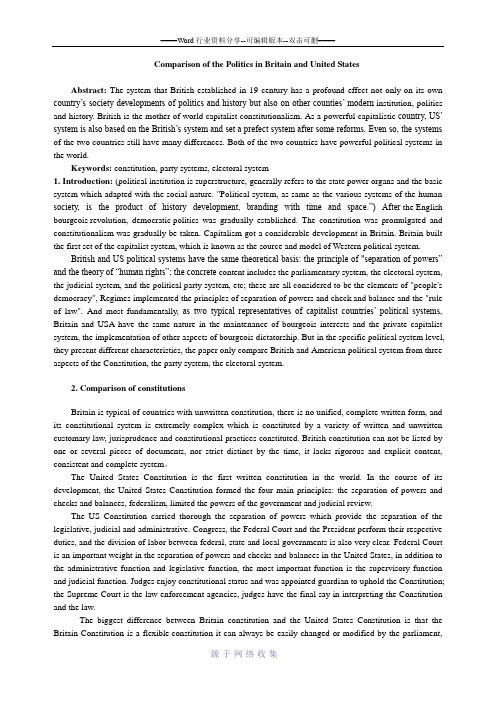
Comparison of the Politics in Britain and United StatesAbstract: The system that British established in 19 century has a profound effect not only on its own country’s society developments of politics and history but also on other counties’ modern institution, politics and history. British is the mother of world capitalist constitutionalism. As a powerful capitalistic country, US’ system is also based on the British’s system and set a prefect system after some reforms. Even so, the systems of the two countries still have many differences. Both of the two countries have powerful political systems in the world.Keywords: constitution, party systems, electoral system1. Introduction: (political institution is superstructure, generally refers to the state power organs and the basic system which adapted with the social nature. "Political system, as same as the various systems of the human society, is the product of history development, branding with time and space.”) After the English bourgeois revolution, democratic politics was gradually established. The constitution was promulgated and constitutionalism was gradually be taken. Capitalism got a considerable development in Britain. Britain built the first set of the capitalist system, which is known as the source and model of Western political system.British and US political systems have the same theoretical basis: the principle of "separation of powers” and the theory of “human rights”; the concrete content includes the parliamentary system, the electoral system, the judicial system, and the political party system, etc; these are all considered to be the elements of "people's democracy", Regimes implemented the principles of separation of powers and check and balance and the "rule of law". And most fundamentally,as two typical representatives of capitalist countries’ political systems, Britain and USA have the same nature in the maintenance of bourgeois interests and the private capitalist system, the implementation of other aspects of bourgeois dictatorship. But in the specific political system level, they present different characteristics, the paper only compare British and American political system from three aspects of the Constitution, the party system, the electoral system.2. Comparison of constitutionsBritain is typical of countries with unwritten constitution, there is no unified, complete written form, and its constitutional system is extremely complex which is constituted by a variety of written and unwritten customary law, jurisprudence and constitutional practices constituted. British constitution can not be listed by one or several pieces of documents, nor strict distinct by the time, it lacks rigorous and explicit content, consistent and complete system。
中国的政治体系英语作文
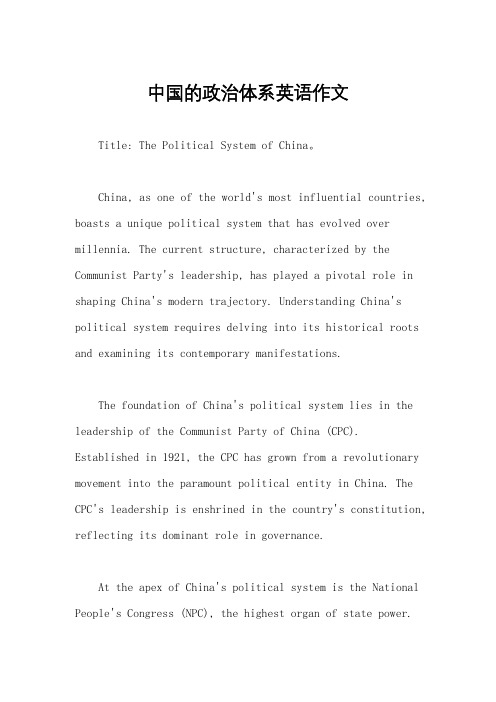
中国的政治体系英语作文Title: The Political System of China。
China, as one of the world's most influential countries, boasts a unique political system that has evolved over millennia. The current structure, characterized by the Communist Party's leadership, has played a pivotal role in shaping China's modern trajectory. Understanding China's political system requires delving into its historical roots and examining its contemporary manifestations.The foundation of China's political system lies in the leadership of the Communist Party of China (CPC). Established in 1921, the CPC has grown from a revolutionary movement into the paramount political entity in China. The CPC's leadership is enshrined in the country's constitution, reflecting its dominant role in governance.At the apex of China's political system is the National People's Congress (NPC), the highest organ of state power.The NPC represents the principle of democratic centralism, where the Party exercises leadership over state institutions. Delegates to the NPC are elected from across China and convene annually to deliberate on key national issues, such as economic development, legislation, and foreign policy.Another crucial aspect of China's political system is its emphasis on collective leadership. Unlike Western democracies characterized by individual leaders, China adopts a collective leadership model, epitomized by the Politburo Standing Committee (PSC). The PSC comprises senior Party officials, including the General Secretary, President, and Premier. Decision-making within the PSC is consensus-driven, emphasizing stability and continuity.Furthermore, China's political system integrates elements of meritocracy. The recruitment and promotion of officials emphasize competence, integrity, and Party loyalty. The Party's Organization Department oversees cadre selection, training, and placement, ensuring a technocratic approach to governance.China's governance extends beyond the central government to provincial and local levels. The hierarchical structure of the Party ensures vertical control and coordination. Provincial Party Committees and People's Congresses mirror the central government's structure, enabling policy implementation tailored to regional needs.The Chinese political system is also characterized by a strong emphasis on stability and social harmony. TheParty's legitimacy hinges on its ability to deliver economic growth and maintain social order. This pragmatic approach underpins China's development model, emphasizing rapid industrialization and poverty alleviation.Moreover, China's political system intertwines with its unique cultural and historical context. Confucian values of hierarchy, order, and filial piety influence governance practices, reinforcing the Party's paternalistic role.Despite its strengths, China's political system faces challenges. The centralized authority of the CPC can stifledissent and political pluralism. Issues such as corruption, inequality, and environmental degradation pose significant governance hurdles.In conclusion, China's political system represents a distinctive fusion of Communist ideology, Confucian values, and pragmatic governance. Its evolution reflects China's complex history and contemporary aspirations. As China assumes a prominent global role, understanding itspolitical system is essential for comprehending its domestic policies and international behavior.。
柬埔寨政体介绍英文作文
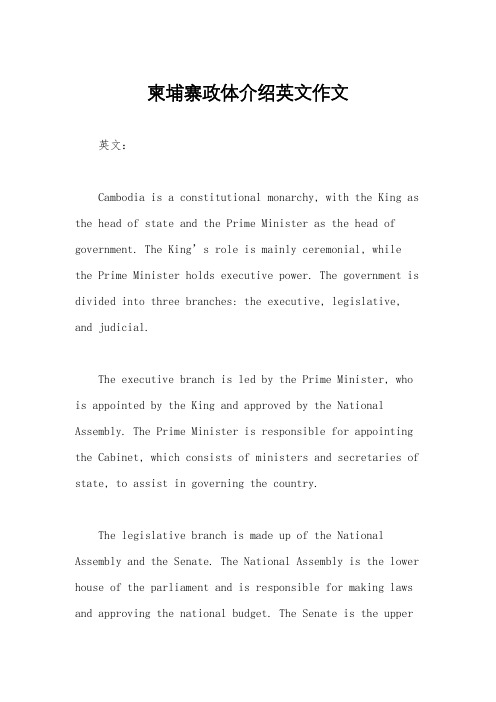
柬埔寨政体介绍英文作文英文:Cambodia is a constitutional monarchy, with the King as the head of state and the Prime Minister as the head of government. The King’s role is mainly ceremonial, while the Prime Minister holds executive power. The government is divided into three branches: the executive, legislative, and judicial.The executive branch is led by the Prime Minister, who is appointed by the King and approved by the National Assembly. The Prime Minister is responsible for appointing the Cabinet, which consists of ministers and secretaries of state, to assist in governing the country.The legislative branch is made up of the National Assembly and the Senate. The National Assembly is the lower house of the parliament and is responsible for making laws and approving the national budget. The Senate is the upperhouse and is responsible for reviewing and approving laws passed by the National Assembly.The judicial branch is independent from the other two branches and is responsible for interpreting and enforcing the law. It is made up of the Supreme Court, the Court of Appeals, and the Municipal and Provincial Courts.Overall, Cambodia’s political system is still developing and faces challenges such as corruption and lack of transparency. However, efforts are being made to improve the system and promote democracy.中文:柬埔寨是一个君主立宪制国家,国王是国家元首,总理是政府首脑。
.发展适合我国国情的社会主义政治制度的英文文章
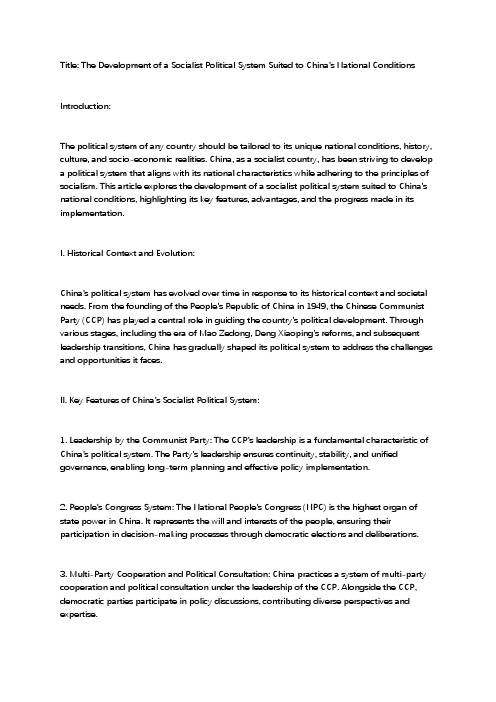
Title: The Development of a Socialist Political System Suited to China's National ConditionsIntroduction:The political system of any country should be tailored to its unique national conditions, history, culture, and socio-economic realities. China, as a socialist country, has been striving to develop a political system that aligns with its national characteristics while adhering to the principles of socialism. This article explores the development of a socialist political system suited to China's national conditions, highlighting its key features, advantages, and the progress made in its implementation.I. Historical Context and Evolution:China's political system has evolved over time in response to its historical context and societal needs. From the founding of the People's Republic of China in 1949, the Chinese Communist Party (CCP) has played a central role in guiding the country's political development. Through various stages, including the era of Mao Zedong, Deng Xiaoping's reforms, and subsequent leadership transitions, China has gradually shaped its political system to address the challenges and opportunities it faces.II. Key Features of China's Socialist Political System:1. Leadership by the Communist Party: The CCP's leadership is a fundamental characteristic of China's political system. The Party's leadership ensures continuity, stability, and unified governance, enabling long-term planning and effective policy implementation.2. People's Congress System: The National People's Congress (NPC) is the highest organ of state power in China. It represents the will and interests of the people, ensuring their participation in decision-making processes through democratic elections and deliberations.3. Multi-Party Cooperation and Political Consultation: China practices a system of multi-party cooperation and political consultation under the leadership of the CCP. Alongside the CCP, democratic parties participate in policy discussions, contributing diverse perspectives and expertise.4. Grassroots Democracy: China emphasizes grassroots democracy and community-level governance, enabling citizens to actively participate in local affairs and decision-making processes. This fosters a sense of ownership and empowerment among the people.5. Rule of Law: China has been strengthening the rule of law to safeguard social justice, protect citizens' rights and interests, and ensure the fair and impartial administration of justice. The establishment of a comprehensive legal framework enhances stability and predictability in the society.III. Advantages of China's Socialist Political System:1. Political Stability: China's political system provides a stable and orderly governance structure, promoting social harmony and economic development. The emphasis on long-term planning and policy continuity contributes to sustained progress and social stability.2. People-Centered Development: The socialist political system prioritizes people's well-being and development. Policies are formulated with the goal of improving the quality of life, reducing poverty, and promoting equitable growth across regions.3. Efficient Decision-Making: The centralized leadership of the CCP allows for efficient decision-making processes, enabling the implementation of large-scale initiatives, such as poverty alleviation campaigns, infrastructure development, and environmental protection measures.4. Adaptive Governance: China's political system is capable of responding and adapting to changing circumstances. Through periodic evaluations and policy adjustments, it addresses emerging challenges and ensures the government remains responsive to the needs of the people.IV. Progress and Challenges:China has made remarkable progress in developing and implementing its socialist political system. The successful practice of socialism with Chinese characteristics has lifted millions out of poverty, improved living standards, and elevated China's global standing. However, challenges remain, including strengthening the protection of individual rights, enhancing transparency, and deepening democratic participation at all levels of governance.Conclusion:The development of a socialist political system suited to China's national conditions has been an ongoing process that reflects the country's unique history, culture, and socio-economic realities. China's political system, with its key features of Party leadership, people's participation, multi-party cooperation, grassroots democracy, and the rule of law, provides a solid foundation for stability, progress, and people-centered development. The continuous improvement and adaptation of the system will be vital in addressing challenges, ensuring good governance, and advancing the well-being of the Chinese people.。
英语国家概况 Chapter 12

Chapter 12 Ireland TodayI. Political Structure 政治体制Ireland is a parliamentary republic and a unitary统一的s tate under the 1937 Constitution. The Constitution is theoretically 理论上applicable适用于to the whole of Ireland. Citizens of Northern Ireland are also considered citizens and can run for office 竞选in the South. The Republic of Ireland consists of 26 of the 32 counties of Ireland.根据1937年的宪法,爱尔兰是议会制共和国是中央集权国家。
理论上讲,此宪法适用于整个爱尔兰岛,北爱尔兰公民也被视为共和国公民,能够竞选南方的职位。
爱尔兰共和国由爱尔兰岛的32个郡中的26个郡组成。
1. Executive power 行政权suffrage 直接投票任期七年He sommons or dissolves the Oireachtas议会(Parliament); signs and promulgate s 颁布laws; appoints judges, the prime minister and other members of the cabinet;内阁and heads the defence forces.武装部队In addition, he has the right to refer提交certain bills to the Supreme Court for a decision on their constitutionality符合宪法and refer certain bills to the people by referendum. 全民公决The president is advised and assisted in his duties by the Council of State.国家委员会他召集或解散议会;签署和颁布法律;任命法官、首相和其他内阁成员;统率武装部队。
英语国家概况英国的政府体制

英语国家概况英国的政府体制看英国的征服体制,了解这个国家的概况情况。
下面是店铺带来英国的政府体制相关介绍,欢迎大家阅读!英语国家概况:英国的政府体制介绍Government and Administration英国政府机构I.General knowledgeThe United Kingdom is a constitutional monarchy,the head of state is a king or a queen. The UnitedKingdom is governed, in the name of the Sovereignby His or Her Majesty's Government. The System ofparliamentary government is not based on a writtenconstitution, the British constitution is not set out in any single document. It is made up ofstatute law, common law and conventions. The Judiciary determines common law andinterprets statutes.联合王国是君主立宪制国家,国家的首脑是国王或女王。
联合王国以君的名义,由国王或女王陛下政府治理。
英国的议会制度并不是基于成文宪法,英国宪法不由单一文件构成,而由成文法,习惯法和惯例组成。
司法部门裁定习惯法或解释成文法。
英语国家概况:英国的政府体制(君主立宪制)Constitutional monarchy 君主立宪制The British monarchy is known as constitutional monarchy. It means the monarchy's powerare limited by law and Parliament. The monarchy actually has no ral power. Constitutionalmonarchy began after the Glorious Revolution in 1688.英国的君主体制是以君主立宪闻名的。
英语国家概况结课作业小论文
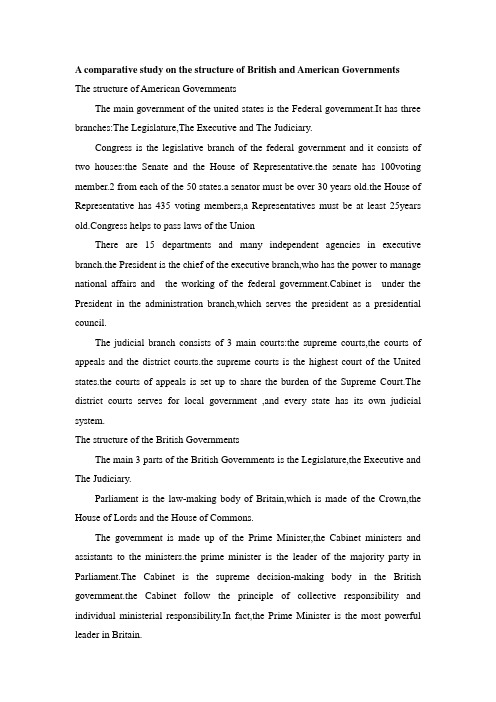
A comparative study on the structure of British and American Governments The structure of American GovernmentsThe main government of the united states is the Federal government.It has three branches:The Legislature,The Executive and The Judiciary.Congress is the legislative branch of the federal government and it consists of two houses:the Senate and the House of Representative.the senate has 100voting member.2 from each of the 50 states.a senator must be over 30 years old.the House of Representative has 435 voting members,a Representatives must be at least 25years old.Congress helps to pass laws of the UnionThere are 15 departments and many independent agencies in executive branch.the President is the chief of the executive branch,who has the power to manage national affairs and the working of the federal government.Cabinet is under the President in the administration branch,which serves the president as a presidential council.The judicial branch consists of 3 main courts:the supreme courts,the courts of appeals and the district courts.the supreme courts is the highest court of the United states.the courts of appeals is set up to share the burden of the Supreme Court.The district courts serves for local government ,and every state has its own judicial system.The structure of the British GovernmentsThe main 3 parts of the British Governments is the Legislature,the Executive and The Judiciary.Parliament is the law-making body of Britain,which is made of the Crown,the House of Lords and the House of Commons.The government is made up of the Prime Minister,the Cabinet ministers and assistants to the ministers.the prime minister is the leader of the majority party in Parliament.The Cabinet is the supreme decision-making body in the British government.the Cabinet follow the principle of collective responsibility and individual ministerial responsibility.In fact,the Prime Minister is the most powerful leader in Britain.The judicial branch is complicated in British.every district has there own legal systems.the magistrates’court deal with all criminal cases.the Crown Court deal with the more serious cases,which will go to high court or the Court of Appeal or even the supreme court。
英国美国政治制度英语作文
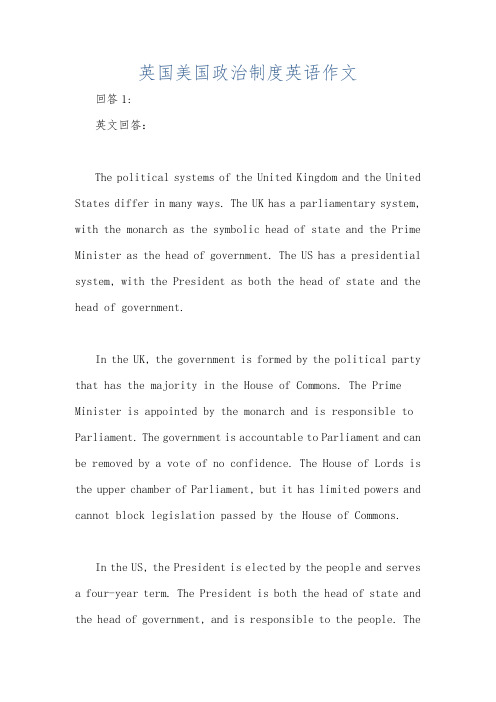
英国美国政治制度英语作文回答1:英文回答:The political systems of the United Kingdom and the United States differ in many ways. The UK has a parliamentary system, with the monarch as the symbolic head of state and the Prime Minister as the head of government. The US has a presidential system, with the President as both the head of state and the head of government.In the UK, the government is formed by the political party that has the majority in the House of Commons. The Prime Minister is appointed by the monarch and is responsible to Parliament. The government is accountable to Parliament and can be removed by a vote of no confidence. The House of Lords is the upper chamber of Parliament, but it has limited powers and cannot block legislation passed by the House of Commons.In the US, the President is elected by the people and serves a four-year term. The President is both the head of state and the head of government, and is responsible to the people. ThePresident is assisted by a Cabinet, which is made up of the heads of various government departments. The US Congress is the legislative branch of government, with the House of Representatives and the Senate as its two chambers. Both chambers have equal powers, and legislation must be passed by both in order to become law.Another significant difference between the two systems is the role of the judiciary. In the UK, judges are appointed by the monarch on the advice of the Prime Minister. In the US, judges are appointed by the President and confirmed by the Senate. The US Supreme Court is the highest court in the land, and has the power to strike down laws that are deemed unconstitutional.Overall, while both the UK and the US have democratic political systems, they differ in terms of the roles of the head of state, the head of government, and the legislative and judicial branches of government.中文回答:英国和美国的政治制度在许多方面都存在差异。
英国美国政治制度英语作文
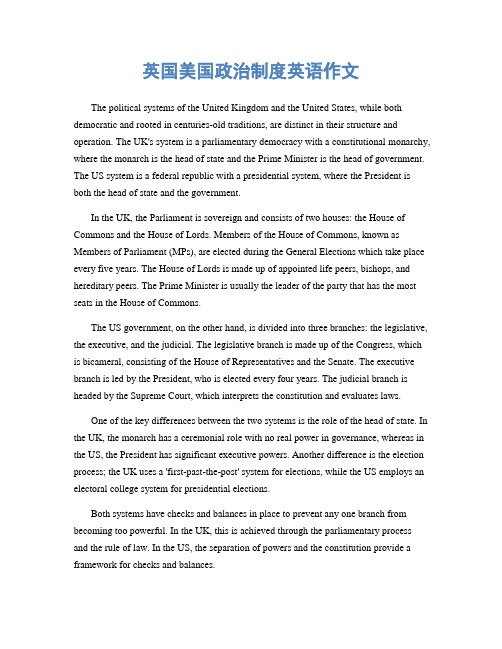
英国美国政治制度英语作文The political systems of the United Kingdom and the United States, while both democratic and rooted in centuries-old traditions, are distinct in their structure and operation. The UK's system is a parliamentary democracy with a constitutional monarchy, where the monarch is the head of state and the Prime Minister is the head of government. The US system is a federal republic with a presidential system, where the President is both the head of state and the government.In the UK, the Parliament is sovereign and consists of two houses: the House of Commons and the House of Lords. Members of the House of Commons, known as Members of Parliament (MPs), are elected during the General Elections which take place every five years. The House of Lords is made up of appointed life peers, bishops, and hereditary peers. The Prime Minister is usually the leader of the party that has the most seats in the House of Commons.The US government, on the other hand, is divided into three branches: the legislative, the executive, and the judicial. The legislative branch is made up of the Congress, which is bicameral, consisting of the House of Representatives and the Senate. The executive branch is led by the President, who is elected every four years. The judicial branch is headed by the Supreme Court, which interprets the constitution and evaluates laws.One of the key differences between the two systems is the role of the head of state. In the UK, the monarch has a ceremonial role with no real power in governance, whereas in the US, the President has significant executive powers. Another difference is the election process; the UK uses a 'first-past-the-post' system for elections, while the US employs an electoral college system for presidential elections.Both systems have checks and balances in place to prevent any one branch from becoming too powerful. In the UK, this is achieved through the parliamentary process and the rule of law. In the US, the separation of powers and the constitution provide a framework for checks and balances.The UK's unwritten constitution, composed of statutes, conventions, and legal precedents, contrasts with the US's single written constitution. The flexibility of the UK's system allows for evolution over time, while the US constitution, with its amendments, provides a more rigid framework.In conclusion, the political systems of the UK and the US share a commitment to democratic principles but differ significantly in their approach to governance. The UK's parliamentary system with a constitutional monarchy and the US's federal republic with a presidential system reflect their unique historical and cultural developments. Understanding these differences is crucial for anyone looking to grasp the complexities of modern governance in these two influential countries.。
英语国家概况论文(英国民主政治发展史)
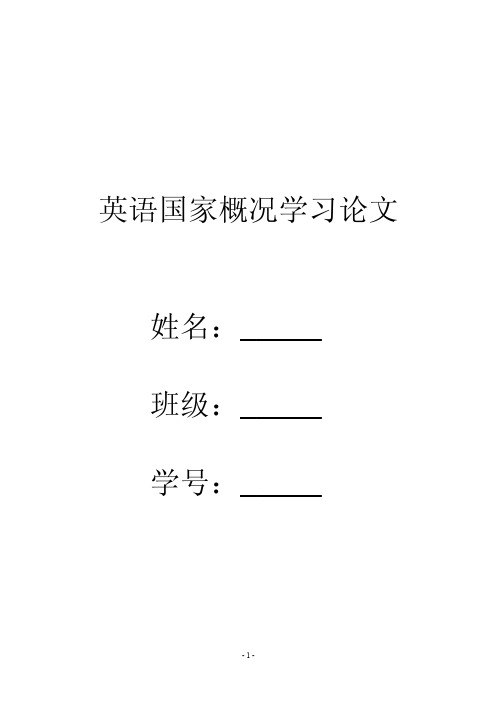
英语国家概况学习论文姓名:_____班级:_____学号:_____The history of the democratic political development in the United KingdomAbstract: As we know, the United Kingdom is arguably the oldest representative democracy in the world, its representative democracy originated one thousand years ago. Although the United Kingdom founded the modern political system so early, its establishment truly has experienced a very long process, some events have a significant impact on it. This long and unbroken history is still apparent in the United Kingdom's current institutions and culture. Generally speaking, the United Kingdom democratic political development is a compromise, progressive process.Key words: history; democratic political development; the United KingdomThe Monarchy and Divine Right of KingsIn the United Kingdom,the oldest institution of government is the Monarchy,this dates back to the Saxons who ruled from the 5th century AD until the Norman Conquest in 1066.The present Queen,Elizabeth II, is directly descended from King Egbert, who united England under his rule in 829. The power of the monarchy was largely derived from the ancient doctrine of the "divine right of Kings". It asserts that a monarch is subject to no earthly authority, deriving the right to rule directly from the will of God. The king is thus not subject to the will of his people, the aristocracy, or any other estate of the realm, including (in the view of some, especially in Protestant countries) the Church. According to this doctrine, only God can judge an unjust king. The doctrine implies that any attempt to depose the king or to restrict his powers runs contrary to the will of God and may constitute a sacrilegious act.The Magna CartaThe Magna Carta, or Great Charter, is a document created for the purpose of limiting the powers of the monarch and preserving the basic legal rights of all free men in England. It was made after a rebellion in 1215 against King John of England, a corrupt, absolute monarch who angered all those under the influence of his power. The Barons, rich land owners and direct vassals of the King, would no longer tolerate the abuses of power conducted under John’s reign, and demanded a change in government. John was forced to meet with them at Runnymede on June 15, 1215. There the Barons proposed the Magna Carta, a document similar to, as well as an ancestor of, the Bill of Rights. After several days of debate, the King gave in to the Barons’ demands and adopted the charter into the British s ystem of government on June 19th.The Magna Carta was eventually sent out to all of the towns and provinces of England so that all free men could see their basic legal rights. Among the rights granted by the document are a trial by jury, a punishment fitting and not excessive to the crime, and no taxation without representation. To whom these rights were granted has been heavily debated. The barons who created the Magna Carta originally intended it toprotect only the rich, upper class of the feudal system. It was reinterpreted by many leaders and politicians for years after it was created, and with each it was applied to more and more groups of people. With the interpretation of Sir Edward Coke, a 17th century British Secretary of State, the rights in the Magna Carta could even be applied to American colonists. The colonists felt that the government was violating a basic right granted them in the charter, they were being taxed without representation in Parliament. This belief led to the creation of the Declaration of Independence.The Magna Carta marked a turning point in world history. Until the 13th century in England, European rulers were absolute monarchs. With absolute rule came absolute power; these rulers had the power to do and order anything they chose. The end of absolute power in the United Kingdom came with the revolutionary Magna Carta, which established a set of laws that not even the king could violate. The same laws that applied to the lowest class of society applied to everyone, even to the royal family. The Magna Carta was a major first step toward the democracies of today, governments in which there are no monarchs but rather self governing citizens.The Bill of Rights of 1689The Bill of Rights is an Act of the Parliament of England passed on 16 December 1689. It was a restatement in statutory form of the Declaration of Right presented by the Convention Parliament to William and Mary in March 1689 (or 1688 by Old Style dating), inviting them to become joint sovereigns of England. It lays down limits on the powers of the crown and sets out the rights of Parliament and rules for freedom of speech in Parliament, the requirement to regular elections to Parliament and the right to petition the monarch without fear of retribution. It reestablished the liberty of Protestants to have arms for their defence within the rule of law, and condemned James II of England for "causing several good subjects being Protestants to be disarmed at the same time when papists were both armed and employed contrary to law".The birth of the Prime Minister and CabinetThe origins of the position are found in constitutional changes that occurred during the Revolutionary Settlement (1688–1720) and the resulting shift of political power from the Sovereign to Parliament. Although the Sovereign was not stripped of the ancient prerogative powers and legally remained the head of government, politically it gradually became necessary for him or her to govern through a Prime Minister who could command a majority in Parliament.By the 1830s the Westminster system of government (or cabinet government) had emerged; the Prime Minister had become primus inter pares or the first among equals in the Cabinet and the head of government in the United Kingdom. The political position of Prime Minister was enhanced by the development of modern political parties, the introduction of mass communication (inexpensive newspapers, radio,television and the internet), and photography. By the turn of the 20th century the modern premiership had emerged; the office had become the pre-eminent position in the constitutional hierarchy vis-a-vis the Sovereign, Parliament and Cabinet.Prior to 1902, the Prime Minister sometimes came from the House of Lords, provided that his government could form a majority in the Commons. However as the power of the aristocracy waned during the 19th century the convention developed that the Prime Minister should always sit in the lower house. As leader of the House of Commons, the Prime Minister's authority was further enhanced by the Parliament Act of 1911 which marginalised the influence of the House of Lords in the law-making process. The accretion of so much political power in one position gave rise to concerns that the office had become too "presidential", and that the Prime Minister was an "elected Monarch".The United Kingdom government todayThe Government is led by the Prime Minister, who selects all the remaining Ministers. The Prime Minister and the other most senior Ministers belong to the supreme decision-making committee, known as the Cabinet. The Government Ministers are all members of Parliament, and are accountable to it. The Government is dependent on Parliament to make primary legislation, which means that in practice a government must seek re-election at least every five years. The monarch selects the Prime Minister as the leader of the party most likely to command a majority in Parliament.Under the British constitution, executive authority lies with the monarch, although this authority is exercised only by, or on the advice of, the Prime Minister and the Cabinet. The Cabinet members advise the monarch as members of the Privy Council. They also exercise power directly as leaders of the Government Departments.The role of the monarchy today is primarily to symbolize the tradition and unity of the United Kingdom.The Queen,however,because she is non-political, belongs to everyone. Under the terms of the Constitution her other roles are as follows: she is legally head of executive, an integral part of the legislature, head of the judiciary, commander in chief of the armed forces and "supreme governor" of the Church of England.The UK Parliament is the supreme legislative body in the United Kingdom (i.e., there is parliamentary sovereignty), and Government is drawn from and answerable to it. Parliament is bicameral, consisting of the House of Commons and the House of Lords. There is also a devolved Scottish Parliament and devolved Assemblies in Wales and Northern Ireland, with varying degrees of legislative authority.The Constitution of the United Kingdom is uncodified, being made up of constitutional conventions, statutes and other elements. This system of government, known as the Westminster system, has been adopted by other countries, especially those that were formerly parts of the British Empire.The current Prime Minister is David Cameron, leader of the Conservative Party, who was appointed by Queen Elizabeth II on 11 May 2010 following the UK General Election on 6 May 2010. The election failed to provide a decisive result, with the Conservatives as the biggest party within a hung parliament. A coalition government was formed on the 12th of May between the Conservatives and the Liberal Democrats .。
中国政治制度介绍英文

中国政治制度介绍英文Introduction to China's Political SystemChina, officially known as the People's Republic of China, is a country with a unique political system that has evolved over thousands of years. The political structure in China is based on the principle of socialism with Chinese characteristics, and it has its own distinct features that differentiate it from other political systems in the world. In this article, we will provide an overview of the political system in China.1. The Communist Party of China (CPC):The Communist Party of China is the ruling political party in China. It was founded in 1921 and has been in power since 1949. The CPC is governed by a Central Committee, which consists of top leaders, and it exercises supreme authority in decision-making and policy formulation in China.2. The National People's Congress (NPC):The National People's Congress is the highest organ of state power in China. It is the legislative body and is responsible for making and amending laws. The NPC is composed of nearly 3,000 delegates who are elected from all provinces, autonomous regions, municipalities, and special administrative regions across China.3. The State Council:The State Council is the executive branch of the Chinese government. It is led by the Premier, who is appointed by the President of China. The State Council is responsible for implementing laws and policies, managing the economy, and overseeing various administrative departments.4. The President:The President of China is the head of state and represents the country both domestically and internationally. The President serves as the ceremonial and symbolic leader of China and is elected by the National People's Congress for a term of five years.5. The Chinese People's Political Consultative Conference (CPPCC):The CPPCC is an advisory body that operates alongside the government. It consists of representatives from various political parties, social organizations, and ethnic minority groups. The CPPCC provides suggestions and proposals on major political and social issues, contributing to the decision-making process.6. The Judiciary System:The legal system in China is based on civil law with Chinese characteristics. The Supreme People's Court is the highest judicialauthority and is responsible for interpreting laws and ensuring their fair implementation. It is supported by lower-level courts and specialized courts for specific areas such as intellectual property and maritime affairs.7. Local Government Structure:China is divided into 23 provinces, 5 autonomous regions, 4 municipalities directly under the central government, and 2 special administrative regions. Each province, autonomous region, and municipality has its own local government structure, which is responsible for implementing policies and managing local affairs.It is important to note that the political system in China is characterized by a strong emphasis on collective leadership and consensus-based decision-making. The CPC plays a central role in guiding and leading the country, and its leadership is based on a combination of meritocracy and organizational discipline.In conclusion, China's political system is a unique and complex entity that has evolved over time. With the CPC at the helm, the system combines socialist principles with Chinese characteristics to govern the country. The National People's Congress and the State Council are key components of the system, ensuring that laws are made and implemented effectively. The CCPCC provides additional perspectives and advice, while the judicial system upholds the rule of law. With its distinctivefeatures and structures, China's political system continues to shape the country's development in the 21st century.。
英国政治英文作文
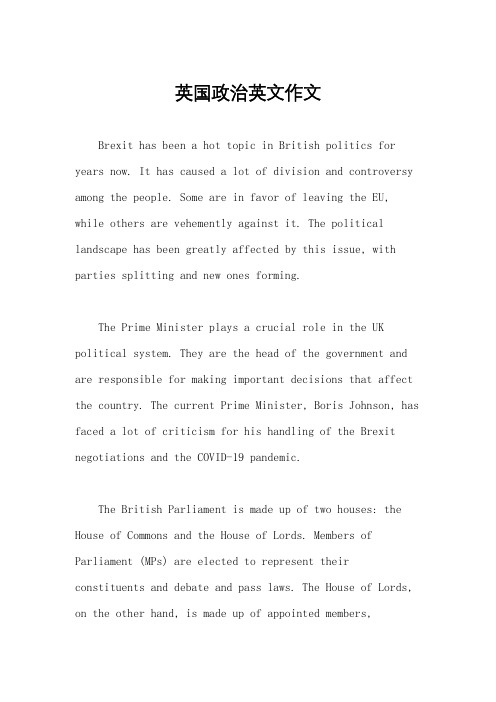
英国政治英文作文Brexit has been a hot topic in British politics for years now. It has caused a lot of division and controversy among the people. Some are in favor of leaving the EU, while others are vehemently against it. The political landscape has been greatly affected by this issue, with parties splitting and new ones forming.The Prime Minister plays a crucial role in the UK political system. They are the head of the government and are responsible for making important decisions that affect the country. The current Prime Minister, Boris Johnson, has faced a lot of criticism for his handling of the Brexit negotiations and the COVID-19 pandemic.The British Parliament is made up of two houses: the House of Commons and the House of Lords. Members of Parliament (MPs) are elected to represent their constituents and debate and pass laws. The House of Lords, on the other hand, is made up of appointed members,including life peers, bishops, and hereditary peers.The UK has a multi-party system, with the Conservative Party and the Labour Party being the two main political forces. However, there are also smaller parties, such as the Liberal Democrats, the Scottish National Party, and the Green Party, which have their own distinct policies and agendas.The monarchy also plays a symbolic role in British politics. The Queen is the head of state, but her powers are largely ceremonial. However, the royal family still holds a significant amount of influence and is often involved in diplomatic and public relations activities.The UK has a long history of political activism and protest. From suffragettes fighting for women's rights to the recent climate change protests led by Extinction Rebellion, the British people have a tradition of speaking out and standing up for what they believe in.The media also plays a significant role in shapingpublic opinion and influencing political discourse. Newspapers like The Guardian, The Times, and The Daily Mail have a wide readership and often take partisan stances on political issues. Social media has also become a powerful tool for politicians and activists to communicate their messages and rally support.。
- 1、下载文档前请自行甄别文档内容的完整性,平台不提供额外的编辑、内容补充、找答案等附加服务。
- 2、"仅部分预览"的文档,不可在线预览部分如存在完整性等问题,可反馈申请退款(可完整预览的文档不适用该条件!)。
- 3、如文档侵犯您的权益,请联系客服反馈,我们会尽快为您处理(人工客服工作时间:9:00-18:30)。
Comparison of the Politics in Britain and United StatesAbstract: The system that British established in 19 century has a profound effect not only on its own country’s society developments of politics and history but also on other counties’ modern institution, politics and history. British is the mother of world capitalist constitutionalism. As a powerful capitalistic country, US’system is also based on the British’s system and set a prefect system after some reforms. Even so, the systems of the two countries still have many differences. Both of the two countries have powerful political systems in the world.Keywords: constitution, party systems, electoral system1. Introduction: (political institution is superstructure, generally refers to the state power organs and the basic system which adapted with the social nature. "Political system, as same as the various systems of the human society, is the product of history development, branding with time and space.”) After the English bourgeois revolution, democratic politics was gradually established. The constitution was promulgated and constitutionalism was gradually be taken. Capitalism got a considerable development in Britain. Britain built the first set of the capitalist system, which is known as the source and model of Western political system.British and US political systems have the same theoretical basis: the principle of "separation of powers” and the theory of “human rights”; the concrete content includes the parliamentary system, the electoral system, the judicial system, and the political party system, etc; these are all considered to be the elements of "people's democracy", Regimes implemented the principles of separation of powers and check and balance and the "rule of law". And most fundamentally,as two typical representatives of capitalist countries’ political systems, Britain and USA have the same nature in the maintenance of bourgeois interests and the private capitalist system, the implementation of other aspects of bourgeois dictatorship. But in the specific political system level, they present different characteristics, the paper only compare British and American political system from three aspects of the Constitution, the party system, the electoral system.2. Comparison of constitutionsBritain is typical of countries with unwritten constitution, there is no unified, complete written form, and its constitutional system is extremely complex which is constituted by a variety of written and unwritten customary law, jurisprudence and constitutional practices constituted. British constitution can not be listed by one or several pieces of documents, nor strict distinct by the time, it lacks rigorous and explicit content, consistent and complete system。
The United States Constitution is the first written constitution in the world. In the course of its development, the United States Constitution formed the four main principles: the separation of powers and checks and balances, federalism, limited the powers of the government and judicial review.The US Constitution carried thorough the separation of powers which provide the separation of the legislative, judicial and administrative. Congress, the Federal Court and the President perform their respective duties, and the division of labor between federal, state and local governments is also very clear. Federal Court is an important weight in the separation of powers and checks and balances in the United States, in addition to the administrative function and legislative function, the most important function is the supervisory function and judicial function. Judges enjoy constitutional status and was appointed guardian to uphold the Constitution; theSupreme Court is the law enforcement agencies, judges have the final say in interpreting the Constitution and the law.The biggest difference between Britain constitution and the United States Constitution is that the Britain Constitution is a flexible constitution it can always be easily changed or modified by the parliament, while, while the United States Constitution is rigid; second, the British constitution is conservative. And the US Constitution is relatively open; third, the British constitution has continuity. This continuity depends on the continuity of the England national life. Last but not the least, the theory and practice in Britain are often not consistent with the British constitution.3. Comparison of political party systemsParty political system has a special status in Western countries; it is strongly associated with the election, parliamen t, cabinet and other systems, so Western countries’ politics is also known as the political party. As the center of social political life, Political parties join f all aspects of the political system together. As talk about the system, the United States and Britain all belongs to two-party system while they also have their own characteristics on their two-party system.Britain is the cradle of modern party politics and Britain is also a typical country who implements two-party system. There are two important political parties in Britain and they have dominated British politics for more than 100 years. First are the Tories and Whigs, then the Conservative Party and the Liberal Party, and later are the Conservatives and the Labor Party. Britain implements a parliamentary cabinet system; there are House of Lords and the House of Commons. Therefore, its political system and the House of Lords and House of Commons are connected firmly; the ruling party and the opposition party have clear boundaries in the forms. The senators of the House of Lords are not elected by election, senators of the upper house are appointed by the hereditary nobilities or the king. The senators of House of Commons are elected by election.The two major parties win the seats in the House of Commons by compete in the Campaign, Who received more seats in the cabinet; the party leader will be the prime minister and gets the government power. The party politics of the Cabinet will be the ruling party. The ruling party not only gets the real power of masters the Cabinet but also the real power of master House of Commons. Parties which lose in the election are called out-party or the opposition parties. These parties have the right and responsibility to oversight the government; there can set a "shadow cabinet." which consist with the Ministers come from all parties. (The Official Opposition (the non-government party with the largest number of elected members of Parliament —currently the Labour Party) is headed by the Shadow and is supported by numerous junior opposition frontbenchers.The Liberal Democrats, as the only other party with a large number of seats, used to call their leadership while in opposition the Liberal Democrat Frontbench Team, but during the last Labor government, they started to use the term 'Shadow Cabinet'.)Parliamentary cabinet system combines with the ruling and opposition parties in the form of clear boundaries between the two mutual restraints. The oppositions have the right and responsibility to oversight the government. Parliament is entitled to come forward Cabinet no-confidence cases, while the prime minister can also petition the King to dissolve parliament. The two major political parties are taking a centralism, whether in central government or local, every party has a sound organization; strict discipline; especially in the party for parliamentary vote, there are strict rules. Important vote in parliament, political parties will require their partymembers as a group, to vote in accordance with the intent of leaders. Or the party members will be severely punished.USA is also a typical country implement two-party system; the United States is a presidential country. Its party system is related with a democratic republic and the main activity of political parties is the presidential election. Winner in the election will be the ruling party and the loser will be the opposition. Although the senators of US Congress are elected by the election, the ruling position of the two major parties has nothing to do with the number of seats in the parliament. In the United States, if a political party wins in the presidential election and even if it fails in the congressional elections, it will not affect its ruling status. USA political parties are loose organized; there is no strict organization and discipline in the parties. America's two-party system comes from opposition between the Federal Party and the burgeoning anti-federal party, and later became the competition between the Republican Party and the Democratic Party. In USA history, used to have a third-party movement, but never succeed. The structure of two major political parties take turns in power has been relatively stable.Although the two countries both have a two-party system, there has been many big differences between the two countries. And here are the main differences:First, they are different regimes types. Britain imposed to be constitutional monarchy; the king of England is a hereditary head of state. Judging from the Constitution, the King gets the top power. But in fact British king should obey the arrangements which made by the cabinet.的地位。
